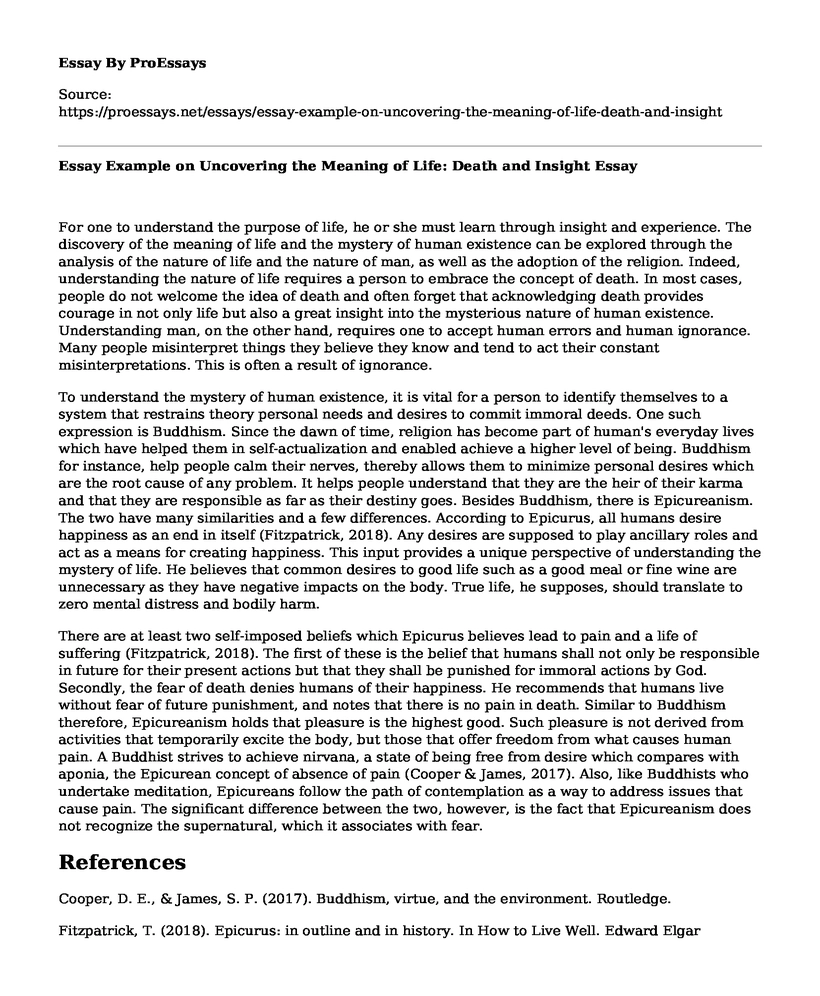For one to understand the purpose of life, he or she must learn through insight and experience. The discovery of the meaning of life and the mystery of human existence can be explored through the analysis of the nature of life and the nature of man, as well as the adoption of the religion. Indeed, understanding the nature of life requires a person to embrace the concept of death. In most cases, people do not welcome the idea of death and often forget that acknowledging death provides courage in not only life but also a great insight into the mysterious nature of human existence. Understanding man, on the other hand, requires one to accept human errors and human ignorance. Many people misinterpret things they believe they know and tend to act their constant misinterpretations. This is often a result of ignorance.
To understand the mystery of human existence, it is vital for a person to identify themselves to a system that restrains theory personal needs and desires to commit immoral deeds. One such expression is Buddhism. Since the dawn of time, religion has become part of human's everyday lives which have helped them in self-actualization and enabled achieve a higher level of being. Buddhism for instance, help people calm their nerves, thereby allows them to minimize personal desires which are the root cause of any problem. It helps people understand that they are the heir of their karma and that they are responsible as far as their destiny goes. Besides Buddhism, there is Epicureanism. The two have many similarities and a few differences. According to Epicurus, all humans desire happiness as an end in itself (Fitzpatrick, 2018). Any desires are supposed to play ancillary roles and act as a means for creating happiness. This input provides a unique perspective of understanding the mystery of life. He believes that common desires to good life such as a good meal or fine wine are unnecessary as they have negative impacts on the body. True life, he supposes, should translate to zero mental distress and bodily harm.
There are at least two self-imposed beliefs which Epicurus believes lead to pain and a life of suffering (Fitzpatrick, 2018). The first of these is the belief that humans shall not only be responsible in future for their present actions but that they shall be punished for immoral actions by God. Secondly, the fear of death denies humans of their happiness. He recommends that humans live without fear of future punishment, and notes that there is no pain in death. Similar to Buddhism therefore, Epicureanism holds that pleasure is the highest good. Such pleasure is not derived from activities that temporarily excite the body, but those that offer freedom from what causes human pain. A Buddhist strives to achieve nirvana, a state of being free from desire which compares with aponia, the Epicurean concept of absence of pain (Cooper & James, 2017). Also, like Buddhists who undertake meditation, Epicureans follow the path of contemplation as a way to address issues that cause pain. The significant difference between the two, however, is the fact that Epicureanism does not recognize the supernatural, which it associates with fear.
References
Cooper, D. E., & James, S. P. (2017). Buddhism, virtue, and the environment. Routledge.
Fitzpatrick, T. (2018). Epicurus: in outline and in history. In How to Live Well. Edward Elgar Publishing.
Cite this page
Essay Example on Uncovering the Meaning of Life: Death and Insight. (2023, Jan 02). Retrieved from https://proessays.net/essays/essay-example-on-uncovering-the-meaning-of-life-death-and-insight
If you are the original author of this essay and no longer wish to have it published on the ProEssays website, please click below to request its removal:
- Assessment of a Goodlife Essay
- Kant and the Golden Rule - Essay Sample
- Essay Example on Daily Work: The Meaning of Life
- Essay Sample on Finding Meaning in Life
- Essay Sample on Developing Professional Identity: Factors & Processes
- Essay Sample on Aristotle's View of Human Nature: Rationality, Sensitivity, & Desire
- Epistemology: S-Knows-That-P Terrible Consequences - Essay Sample







